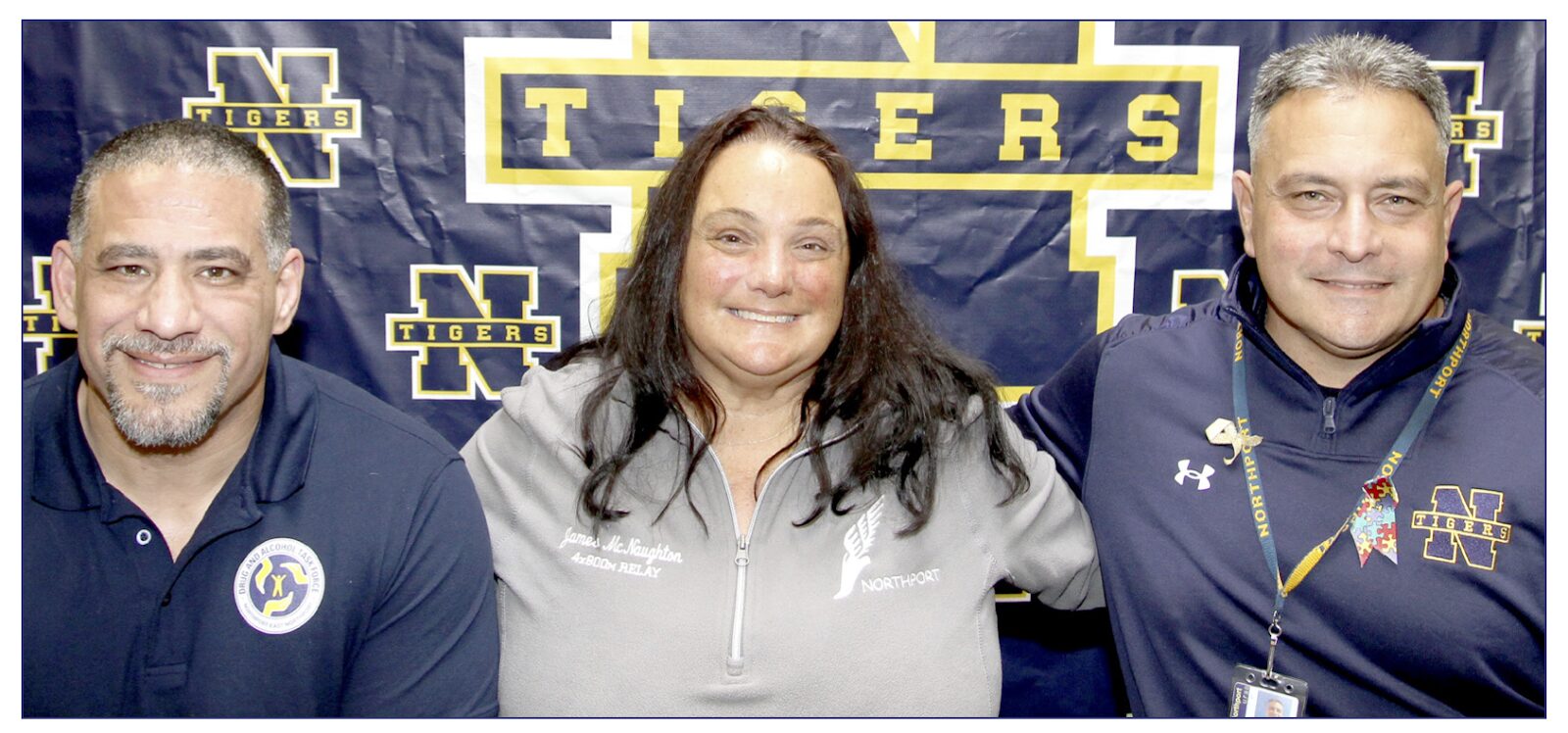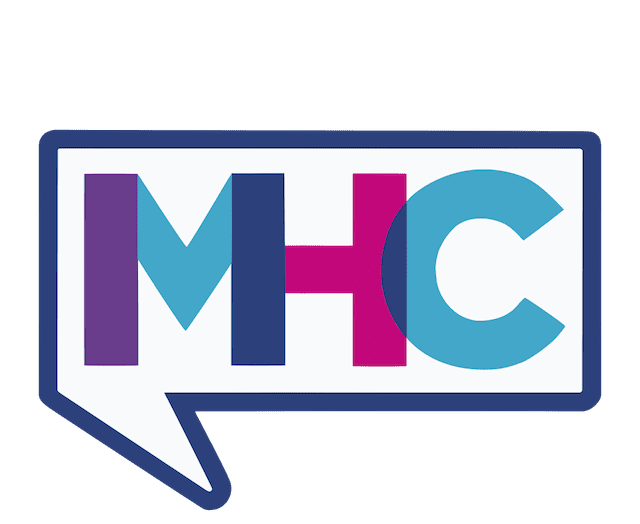Originally published in The Observer / November 28, 2024/
FORWARD-THINKERS: Student assistance counselor Anthony Ferrandino, Jennifer McNaughton and athletic director Mark Dantuono (from left) have been at the forefront of the movement to get then school district’s health and physical education staff and athletic coaches trained to address mental health issues among their students and athletes. -Tom Allegra photo

The Coach Approach
Northport first school district on LI to join forces with Mental Health Collaborative in training health & physical education staff
By Tom Allegra
Mental health is a difficult subject to broach. Talking about it has been taboo for far too long. Struggling and suffering through a mental health crisis was once thought—and even taught—to be a sign of weakness. But the ability for someone to communicate their own mental health struggles is a strength. It is the very definition of strength. It takes great courage and resolve to reveal oneself, to ask for help, when all that someone suffering from anxiety and depression really wants to do is isolate, hide and avoid—partly because they’re embarrassed and ashamed to feel the way they do, and partly because they don’t want to be judged, ridiculed or mocked. Especially a student.
“Most kids want to hide it from their parents, so where do they go? That’s where the coaches come into play,” said Jennifer McNaughton, a 1988 Northport High School graduate who helped spark the Northport-East Northport School District’s recent implementation of the Mental Health Essentials for Coaches program. “If someone along the way can make a difference in what they say to someone who is struggling, in how they say something, maybe that can help. Maybe they can recognize what that person is feeling.”
Ms. McNaughton recently was honored by the Suffolk County Legislature with a proclamation for her efforts in raising awareness about mental health and suicide prevention. She was the person who scheduled the initial meeting last spring to approach school district student assistance counselor Anthony Ferrandino and athletic director Mark Dantuono about adopting a program that would equip coaches with the skills to be able to recognize and offer assistance to students struggling through mental health crises.
“Jennifer’s been an outspoken advocate on this issue. This has been her passion,” Mr. Ferrandino said. “She’s been very instrumental in advocating and parent-planning. The idea for this mental health training for coaches took off from that meeting.”
On Superintendent’s conference day Tuesday, November 5, the school district held its first-ever program offering this kind of training for its K-12 health and physical education teachers and coaches—a four-hour segment implemented by Mr. Dantuono and facilitated by members of the Massachusetts-based Mental Health Collaborative (MHC).
Northport is the first school district on Long Island to implement a partnership between its athletic department and student support services that was facilitated by the non-profit MHC. “A lot of people are struggling and they’re afraid to talk about it. I’m a believer of, ‘Let’s be equipped and prepared, and let’s be proactive and not reactive,’” Mr. Dantuono said. “I just kept pressing the issue. I was very adamant to my supervisors that we feel this is a very important idea that can help our staff.”
Mr. Dantuono insisted the members of MHC be physically present as opposed to virtually in order to impart full impact on the meeting. It took extra effort on his part and extra funding from the school district to get it done, but the most important thing is that it didn’t fall on deaf ears. Mr. Ferrandino credited school administration for thinking and acting progressively in embracing and ensuring funding for the program.
“Coaches have a very unique ability because they have a captive audience with a student-athlete. These student- athletes spend so much time with a coach,” Mr. Ferrandino said. “In a recent research focus group, the number one answer kids said they would go to if they needed help was a coach. This is a trusted adult that we want to give skills to.”
“Many of these kids don’t know how to communicate how they feel. Now we’re trying to help kids feel a sense of belonging so these kids feel comfortable sharing something with somebody in this building—even if it’s just one person,” Mr. Dantuono said. “And I’m not by myself with this. We have a great student support team, counselors, teachers and coaches who care. I think the students in Northport schools are fortunate that this is a community of caring.”
The issue is personal for Mr. Dantuono, whose daughter struggled mentally after she sustained two anterior cruciate ligament (ACL) injuries that required surgeries— so much so he said she blacked out during one game.
“It took us down a different pathway where we needed to get her the right support. Only she knew what she was going through. And that’s hard as a parent,” he said. “You feel helpless. But you just need to listen. They don’t need to hear your opinion. You just need to tell them you love them.”
“I think it’s important whether you’re a parent or a coach that you’re engaging them, you’re showing empathy, you’re letting them talk, trying not to react,” Mr. Ferrandino said. “You don’t need all the answers—you just need to let them talk. You express your concern.”
Ms. McNaughton knows this all too well. Her son struggled mentally after his high school friend and classmate committed suicide in September 2022. She had lost her own friend to suicide earlier in her life, but it wasn’t until her son explained what his own depression felt like—“like you’re stuck inside a tunnel,” she said—that she was able to grasp the impact, even though she already was involved with the Northport-East Northport Drug and Alcohol Task Force (DATF), which devotes much of its time to focusing on mental health crises.
“People are suffering with ideas of suicide and hopelessness,” she said, “so I scheduled a meeting with Anthony Ferrandino and I said, ‘This is it now—I’m going to focus and devote myself to this part of the task force.” “My idea was to train the coaches in the schools,” she said. “Once you open up the discussion and you realize that the kid who is the star football player is having the same issues as someone else, it can be relatable. Kids don’t want to tell their parents how they’re feeling; they want to hide it from them. But coaches can often see the signs.”
Less than a year after her meeting with Mr. Ferrandino—and after much lobbying by Mr. Dantuono—the Mental Health Essentials for Coaches was adopted by the school district.
“That was my most happy moment when I knew it was going to happen,” Ms. McNaughton said. “I knew it would open up the conversation more about mental health and help remove the stigma.”
“It was great to have the entire [health and physical education] department together,” Mr. Dantuono said. “When I framed it at the beginning, I said, ‘Many of us are parents, we’re involved on our children’s athletic journey. And besides that some of you currently coach. So this is going to hit us from many different areas.’”
Mental health awareness in the U.S. certainly has grown since 2021, the same year Olympic gymnast Simone Biles withdrew from the Tokyo Olympics and tennis star Naomi Osaka from the French Open due their own personal struggles with anxiety. Yet it took three more years for a single school district on Long Island to bring in the Mental Health Collaborative to help train its staff. Now Ms. McNaughton is hoping the movement here will continue to grow.
“I hope that Mark can be an advocate and, if they find it’s successful in Northport, they’ll promote it to other athletic directors in Section XI [the governing body for Suffolk County scholastic athletics] and have it become a regular part of training our coaches,” she said.
There are many reasons today’s youth are struggling with anxiety, depression and other mental health disorders, perhaps more than at any other time in history. Mr. Dantuono attributed it directly to social media and the “fear of missing out,” overexposure to screen time, the pressures and commitment of travel sports, and the period of Covid during which students lost the ability to interact.
“Communication, connection, caring and consistency—those four aspects of life are important,” Mr. Dantuono said.
But it’s awareness of the symptoms of mental distress rather than the causes that is most important. Mr. Ferrandino, a licensed clinical social worker (LCSW) and Credentialed Alcoholism and Substance Abuse Counselor (CASAC), laid them out.
“A change in mood is the biggest one,” he said. “It’s telling if a kid is usually jovial or happy and now they have a down mood, or if a kid that’s usually even-keeled becomes irritable.”
Then there’s isolation and alienating from friends, too much/not enough sleep, changes in eating, and lack of focus, which can be measurable if a student’s grades have rapidly fluctuated.
“Aware is a key word,” Mr. Dantuono said, “because that’s what [mental health experts] stress. Instead of just being mindful, we need you to be aware [of potential mental health crises]. This is serious. This isn’t just a common cold. This exists. This impacts lives. It impacts families.”
Another key word is engagement for the family members of someone struggling with a mental health issue—how to engage and how not to.
“A non-judgmental demeanor is important, as is showing them care and concern,” Mr. Ferrandino said. “My hope is that we can train coaches and we can build the awareness, the mental health literacy, and create a more supportive culture for our student athlete.”
But parents play a role in this too, and Mr. Ferrandino discussed the do’s and don’ts. Minimizing a child’s feelings, thoughts and words is the biggest don’t, he said.
“Telling them, ‘It’s not that bad’ or ‘It’s nothing’ is probably the biggest shutdown,” he said. “Telling them to suck it up, yelling at them, calling them names—those types of things don’t work. It shuts them down.”
Disparaging a friend group is another big don’t, he said, because “if you call their friends losers, then you’re calling them a loser as well.”
Addressing the issue and seeking counseling, he said, is paramount. “Simply telling them they’re all right, they’ll get through it” doesn’t work, he said.
“Seek assistance. If you’re not comfortable with a student that has an issue, seek out a professional,” Mr. Ferrandino said. “If you have a kid who has struggles with mental health and you’re not comfortable engaging them, go to the mental health expert.”
“This way you’re confronting a problem that you have,” he said, “instead of running from it.”
The mental health crisis is far from over. In fact, it never will be. But when it comes to the Northport-East Northport School District, it is being addressed.
